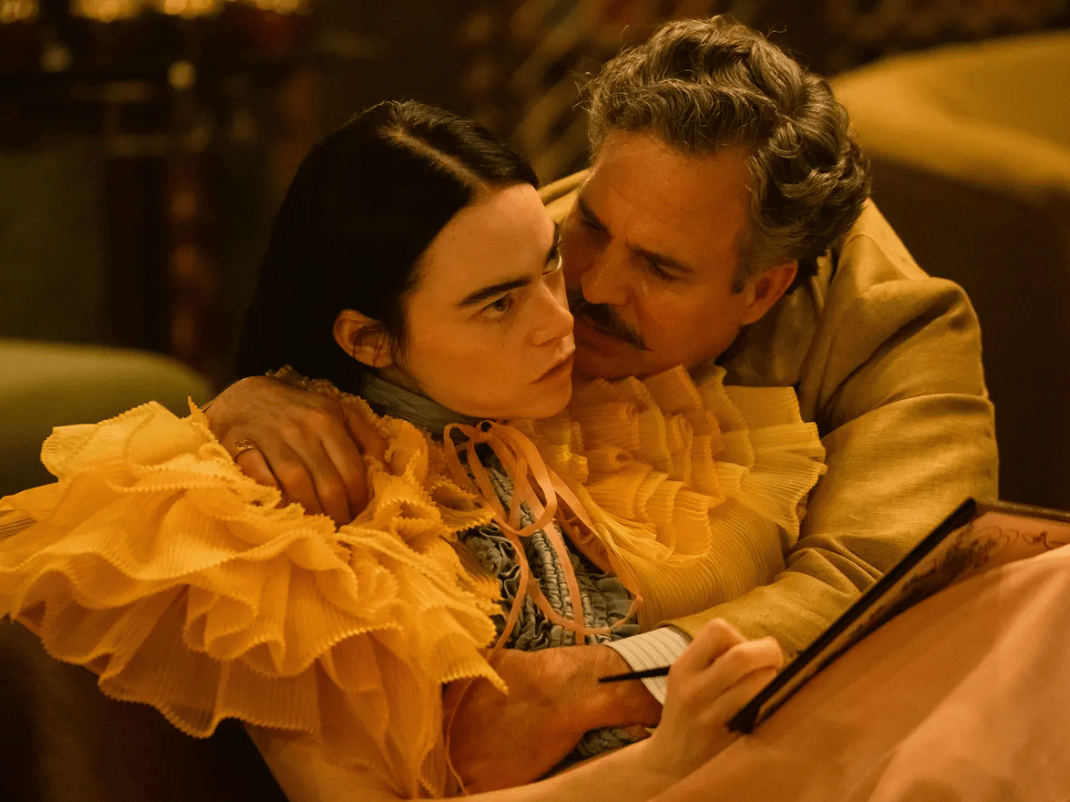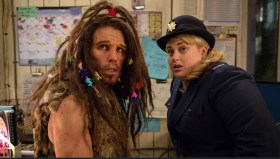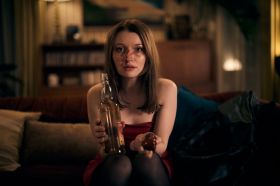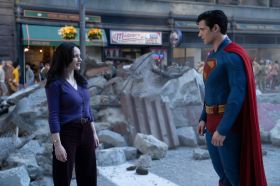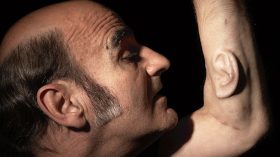A mirrored image of The Wizard of Oz, we plunge from a shock of brilliant emerald and blue and through the murky waters of an elseworlds London’s Thames into a claustrophobic smothering of black and white. In this fatal fall, The Favourite star Emma Stone’s wits end character leaves her true name behind on the wind and is reborn as Bella Baxter.
Greek New Wave director Yorgos Lanthimos’ surrealist spin on the 1992 Alasdair Gray novel Poor Things, adapted by regular Australian writing partner Tony Macnamara, embraces the book’s rewiring of sorts of Mary Shelley’s Prometheus-channelling urtext Frankenstein – more a reclamation of the ill-fated Bride let loose than the lonesome Monster who would be her husband.
The woman who will be Bella is dragged lifeless from the river’s mud by Willem Dafoe’s scar-faced surgeon, Dr Godwin ‘God’ Baxter, who removes the still-beating brain of her unborn child and stitches it into her skull in place of her snuffed-out one. Thereby creating an ungainly adult infant, all incomprehensible wonder as she stumbles around his ornately palatial home, she spits out unamusing food and pleasures herself with gay abandon using whatever comes to hand, including a saucier peach scene than Call Me By Your Name.
Dafoe’s somewhat chaotic and only very occasionally Scottish accent is the singular nod to the novel’s Glasgow setting, transplanted to a much more baroque London than the one we know. Enlisting the aid of medical student Max McCandless, played with bright-eyed pep by Ramy star Ramy Youssef, God pays the younger man to observe her rapid progress and help him keep his creation in check, all the while Bella prods at the boundaries of her gilded cage.
Max can see that their treatment of her is unfair, but he’s not so moved as to refuse God’s offer to marry them off.
Hence Foxcatcher star Mark Ruffalo’s sneering lawyer Duncan Wedderburn is summoned to forge a watertight contract, but instead he does the dirty and runs off with Bella in the middle of the night. She’s already testing her independence and can clearly discern that Duncan is bad news and that her lot would probably be better with Max. Still, for now she craves raw passion and the promise of adventure, opening up the globe with which she has taught herself the name of each country and its capital.
From Lisbon to Paris with lust
Colour returns with a rush of blood to Bella’s world as they travel, at first alighting in a Lisbon that, much like the film’s fairytale London, shares more in common, visually, with Rainer Werner Fassbinder’s stylistically engorged Querelle and the off-kilter art of Hieronymus Bosch than the real deal. Look out for a cruise ship cameo by Fassbinder regular Hanna Schygulla, alongside Jerrod Carmichael’s pessimistic fellow traveller Harry,
While Bella’s ‘furious banging’ with Duncan is, at first, enough, he can neither keep up with her appetites nor constrain her lust for exploration. Wandering the city streets alone, Bella’s self-determined discovery leads her to both feminism and socialism by sheer logic, unbound from the ridiculous constraints of a cruel and unusual patriarchy of which she, born again, has no memory.
It is logic, to her mind, that when they arrive in Paris utterly penniless – the poor need it more, she discerns in a spiralling, cake-like fancy Alexandria that’s very Babel – Bella sets herself to work in a brothel run by The Tragedy of Macbeth’s wyrd triumvirate player Kathryn Hunter in a show-stealing cameo.
It’s during her time here that Bella solidifies her sex-positive attitude and steely determination, be-damned with silly men’s games. She will also take a lover in fellow sex worker Toinette (Suzy Bemba), much to Duncan’s despair. Soon, the cartoonish cad is a snivelling mess of jealous resentment and wounded bravado, with a gloriously unvain turn from Ruffalo providing much of the film’s mordant humour, ably matched by Stone’s deadpanning as Bella, side-eye askance.
An odyssey returns
When wanderlust eventually leads her home, Bella’s relationship with God, as much as her inner self, is transformed. Dafoe’s beautifully judged performance doesn’t shy away from his character’s more abusive traits, a result, perhaps, of inherited trauma, given how he received his multitude of scars. But it also navigates a grace-filled path towards redemption on Bella’s terms.
Her newfound wisdom will not be waylaid by any man, despite a third-act intrusion on her reacquaintance with Max offering moustache-twirling fun for Possessor star Christopher Abbott.
Lanthimos revels in what these off-kilter worlds can tell us about our mirror universe, and while he and MacNamara have jettisoned the multi-narrator ambiguity of the novel in favour of its more fantastical bent, it does not undermine the feminist core.
Stone’s physically transformative performance is surely Oscar-worthy, swaddled in a swathe of magnificently monstrous costumes by Lady Macbeth designer Holly Waddington, running rampant with overblown Victorian ruffles.
It’s a treasure to traverse this fantastic realm, conjured by set designers Shona Heath and James Price, and captured by The Favourite cinematographer Robbie Ryan, favouring fish lenses when Bella is captive and panoramic wonder when set free.
Stone once again proves to be more than a match for Lanthimos’ beguilingly odd odyssey through cinema. To borrow from James Whale’s 1935 black and white masterpiece Bride of Frankenstein: ‘She’s alive! Alive!’
Poor Things played at the 2023 Adelaide Film Festival. It will be released in Australian cinemas on 26 December.
Actors:
Emma Stone, Mark Ruffalo, Willem Dafoe, Ramy Youssef
Director:
Yorgos Lanthimos
Format: Movie
Country: United Kingdom, USA, Ireland
Release: 26 December 2023
